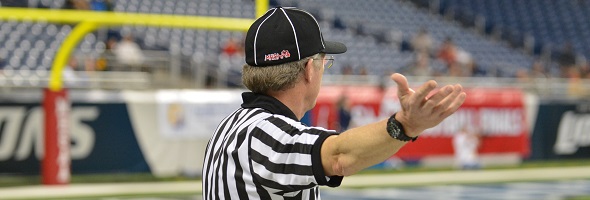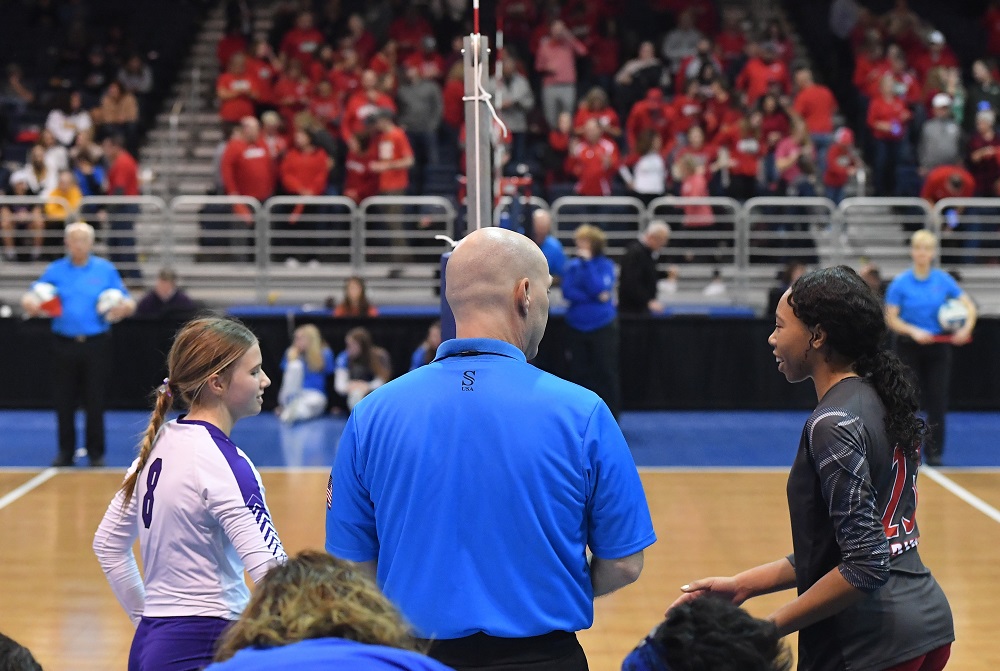
Be the Referee: Personal Fouls
November 5, 2015
This week, MHSAA assistant director Mark Uyl explains how personal fouls are penalized at the high school level.
Be The Referee is a series of short messages designed to help educate people on the rules of different sports, to help them better understand the art of officiating, and to recruit officials.
Below is this week's segment - Make the Call: Personal Fouls - Listen
Late in a key game that’s tied, it’s third down and goal from the 12-yard line after a sack has pushed the offense back. On the third-down play, the quarterback has scrambled and is pulled down again for an apparent sack, but he is pulled to the ground by his facemask.
The officials throw the flag and correctly rule it’s a personal foul facemask. What’s the next down? Under high school rules, personal fouls are NOT an automatic first down. On this play, the officials would walk off the yardage penalty of half-the-distance (to the goal line) and we would replay third down. The only fouls that give the offense an automatic first down are the roughing fouls … roughing the kicker, passer, holder and long snapper.
Past editions:
Oct. 29: Officials Demographics - Listen
Oct. 15: Make the Call: Intentional Grounding - Listen
Oct. 8: Playoff Selection - Listen
Oct. 1: Kick Returns - Listen
Sept. 24: Concussions - Listen
Sept. 17: Automatic First Downs - Listen
Sept. 10: Correcting a Down - Listen
Sept 3: Spearing - Listen
Aug. 27: Missed Field Goal - Listen

Be the Referee: Volleyball Unplayable Areas
By
Paige Winne
MHSAA Marketing & Social Media Coordinator
November 14, 2023
Be The Referee is a series of short messages designed to help educate people on the rules of different sports, to help them better understand the art of officiating, and to recruit officials.
Below is this week's segment – Volleyball Unplayable Areas - Listen
We’re on the volleyball court today when my teammate’s second touch sends the ball towards the bleachers, still on our side of the net. I take off running to attempt to hit it over and jump onto the first row of the stands in order to reach it. I am able to volley the ball over the net, and remarkably it falls to the floor untouched for a point. Or is it?
It is not. The bleachers are not a playable area in volleyball, so my hit wouldn’t count. It would actually be a point for the other team. Despite my best parkour efforts, it’s all for naught.
With player safety in mind, there are other unplayable areas in volleyball including the area behind the benches and the space between the benches and scorer’s table.
Before each match, the officials go over playable and unplayable areas with both coaches.
Previous Editions
Nov. 7: Pass/Kick Off Crossbar - Listen
Oct. 31: Cross Country Interference - Listen
Oct. 24: Soccer Overtime - Listen
Oct. 17: Tennis Spin - Listen
Oct. 10: Blocked Kick - Listen
Oct. 3: Volleyball Double & Lift - Listen
Sept. 26: Registration Process - Listen
Sept. 20: Animal Interference - Listen
Sept. 13: Feet Rule on Soccer Throw-In - Listen
Sept. 6: Volleyball Jewelry - Listen
Aug. 30: Football Rules Similarities - Listen
Aug. 23: Football Rules Differences - Listen

